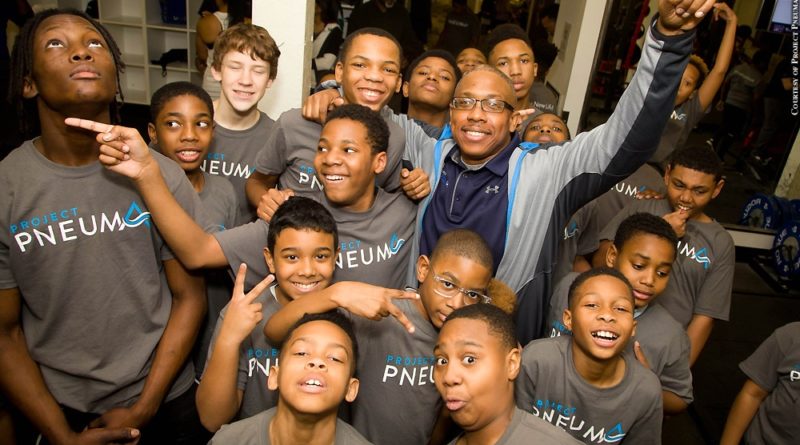As an ordained minister in Baltimore, Damion Cooper has had the solemn duty to preside at more funerals for kids 20-and-under than for people older than 50.
He’s seen kids bleed to death and shut their eyes for the very last time.
“This is why we break our necks, man, to do what we do,” Cooper said. “This is why we gave up full-time jobs that paid us well to do what we do. By no means are we getting rich by this.”
Cooper, 47, is the founder and executive director of Project Pneuma, a growing organization that tries to help improve the lives of boys in grades 4-8 physically, emotionally and spiritually.
The word pneuma is a Greek derivative for the word “breath.” And that is exactly what Cooper, a Dunbar High School graduate and former wrestler for Coppin State, is looking to do: breathe new life and a new spirit into the lives of young people.
In 2014, Cooper started Project Pneuma on a $10,000 grant and helped about 25 boys. Now, the organization serves close to 500 and has entered into long-term partnerships with the Baltimore Police Department, Baltimore City Public Schools and Under Armour.
One of Project Pneuma’s central missions is to promote better relations between city youth and the Baltimore City police.
Twice a week, kids in the Project Pneuma program head to the Baltimore City Public Safety and Training Facility in Northwest Baltimore for three hours of activity, including martial arts, wrestling and yoga.
The facility houses the Baltimore City police academy, and it is here Cooper hopes to foster an environment of friendship, admiration and trust among young kids and police recruits as they grow together.
“We want to build that bridge between them,” Cooper said. “In 2014, we served 25 boys. The number grew to 46 in 2015. Now, we are serving close to 500. People are starting to take notice.”
Project Pneuma has made martial arts and wrestling hallmarks of the program because it forces everyone to be accountable for themselves.
“In basketball and football, you can ride the pine and hide,” Cooper said. “Not in martial arts and wrestling. You have to go out there and compete, and what you do directly affects your entire team.”
Martial arts and wrestling also rely heavily upon the kind of discipline and self-control Cooper hopes to impart to his pupils.
“People are quick to get back at you for any kind of reason,” he said. “They hold onto anger and things like that.”
Cooper’s life changed dramatically Oct. 13, 1992, when, as he returned home from wrestling practice at Coppin State, he was shot from point-blank range on the doorstep of his Baltimore home.
“The bullet hit me an inch above the heart. I can still smell the sulfur and my burnt flesh,” Cooper wrote in a first-person essay on the Project Pneuma website. “I can still see the gaping hole in my chest. I can still feel the cracked sternum, three broken ribs and the biggest bullet fragment lodged under my right armpit and three smaller pieces lodged in the upper part of my chest.
“I can still feel myself choking on my own blood, but refusing to spit it out because I didn’t want my mother to see her only son suffering like that.”
Cooper survived the gunshot, but he spent the next four years of his life holding onto the anger and resentment for everything he had lost, including his wrestling scholarship at Coppin State.
Normally a happy-go-lucky person, he had become somewhat of a recluse. On the night of Dec. 31, 1996, a couple of concerned friends convinced him to attend a church service with them, and it changed his life.
After listening to a gifted preacher, Cooper decided to let go of everything he was holding on to and open his heart to forgiveness. He went to seminary and began mentoring young men in prison.
By sheer happenstance, he began mentoring a prisoner who was serving time for a petty drug offense only to later discover through various channels that it was the same person who had shot him.
In a surreal and heavily monitored face-to-face encounter with the man, Cooper showed his assailant the bullet wound in his chest. He saw fear in the man’s face. And then he forgave him, stepping around the table for an emotional embrace.
“I figured that if I could forgive the man that shot me, I can teach young boys in the city to forgive,” he said.
Cooper is hoping to gradually expand his outreach, eventually making Project Pneuma a national and international organization.
“We don’t talk about if, we talk about when,” said Damien Myers, who gave up a medical practice in 2010 to begin helping young people and now serves as the chief operating officer for Project Pneuma.
Cooper wants to be smart about the way organization grows. He said mistakes can be made if they take on too much too quickly.
“These boys, they want to feel love. They want structure,” he said. “We want them to know that it’s OK to express emotion. It’s OK to express anger. Most of them grow up believing that showing emotion makes you [weak].
“Our main focus is on the mind and on the heart. Once you get to that, everything else is cake. You just need to break that barrier first.”
Photo Credit: Courtesy of Project Pneuma
Issue 254: May 2019

